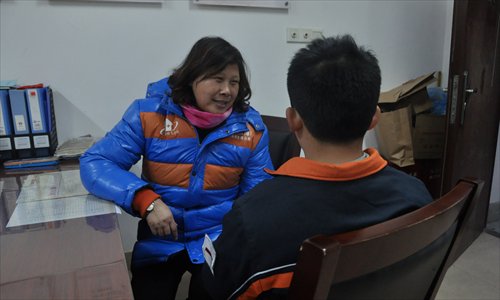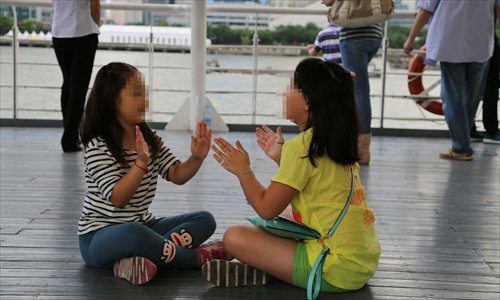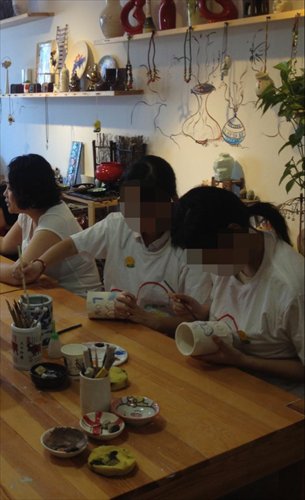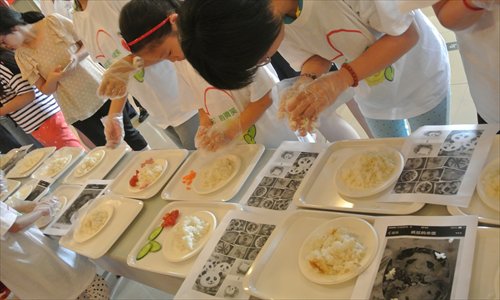Suffer the children!
How Shanghai is looking after the offspring of convicts and addicts
On a cold afternoon in December 2013, 54-year-old retiree Hu Huiqin met 9-year-old Chenchen for the first time. The meeting was in a residential compound in Changning district. Chenchen was a chubby reserved boy. His mother, surnamed Li, was a drug addict.

“Mother Hu” Hu Huiqin talks with Chenchen. Photo: Huang Lanlan/GT
Hu's job was to help the young boy but it was not easy at first. Chenchen kept his head bowed and apart from answering a few questions with yes or no answers stayed silent. "It was as though bad memories had clouded his vision," Hu told the Global Times.
Chenchen certainly had some bad memories. In 1996 his mother Li was arrested by police on drug charges. His father divorced his mother and moved out. After Chenchen was born he lived with his mother and her parents in a small flat in Beixinjing subdistrict.
Qian Fang, a social worker with the Beixinjing Women's Federation, a branch of the Shanghai Women's Federation, explained that Li had spent most of the family's savings on drugs. In 2013 she was sent to a local compulsory detoxification center but was back home a few days later. "Chenchen was very young," Qian said. "It was felt to be too harsh to take his mother away since his father had left."
Qian and other staff at the federation tried to help the child. The best way, they thought, would be to find someone nearby who would voluntarily look after the boy, care for him and cover his living expenses and school fees. Luckily they found Hu who lived in the same residential block.
An awkward beginning
The first day they met she told the boy to call her "Mother Hu." It was very awkward in the beginning. He said practically nothing all day. Hu took him home and gave him some food and sweets. "He hardly spoke at all," Hu said. "But when I put a fresh apple into his hand I saw his eyes fill with tears."
Even today Chenchen hardly ever talks about his mother. "I rarely mention Li in front of him," Hu said. "For Chenchen his mother is a taboo subject. If I talk about her he will be hurt."
The Global Times met Chenchen in the Beixinjing neighborhood committee office after school last week. He wore a dark blue school uniform and red scarf and talked about his favorite computer games and comics. He looked tense and spoke very quietly.
He said he had a good memory and could remember classical poems after just five minutes. But when asked how he got to know "Mother Hu," he shook his head, looked down and said he couldn't recall.
Hu was not disturbed by the boy's behavior. She said he was a lot better than he used to be. "Nowadays he is quite extroverted and much more talkative than he was months ago."
She treats Chenchen as her own child. Though he doesn't live with her she tries her best to look after him. She covers most of his living and school expenses from her pension, phones him regularly after school and takes him on outings. In the committee office she pressed a red envelope with two 100 yuan ($16.17) bills into his hand. "Happy New Year and good luck for your final exam," she said. The boy took the money without saying a word.
No financial support
Over the past few months Hu has spent a lot of her own money on Chenchen. Apart from Hu's generosity and the basic city welfare allowance of 710 yuan a month Chenchen receives no financial support from the government.
In 2013, the Shanghai government announced it would pay children of prisoners a monthly allowance of 1,400 yuan - but only children who had the misfortune to have both parents imprisoned, or be the children of a sole parent who was imprisoned, were eligible for this payment.
"The government is not providing financial support specifically for children of other prisoners or drug addicts," said Chen Lili, the director of the youth service department with the Shanghai Zhongzhi Community Service Agency (SZCSA), a nongovernmental organization in Pudong New Area working on drug rehabilitation and juvenile crime prevention programs.

Two young girls play together at a Shanghai Zhongzhi Community Service Agency (SZCSA) event. Photo: Courtesy of Shanghai Zhongzhi Community Service Agency
Last September, SZCSA carried out a major survey and discovered that in Pudong there were 818 children whose parents were prisoners or drug addicts. Most of them were living impoverished lives with aged grandparents and were isolated and lonely.
Like 14-year-old Shanshan (pseudonym). When she was very young, her father left home to go and work in Vietnam but was arrested after getting involved in a kidnapping and murder. He was extradited to China where he served an 11-year prison term in Nanjing, Jiangsu Province.
Shanshan's mother was Vietnamese and when her husband was arrested she disappeared. After that the little girl had to live with her grandmother, who suffered from dementia. In 2010, after her grandmother passed away, Shanshan was placed in the care of a local resident by SZCSA's social workers.
Thirty-five-year-old Lu Yun was one of the social workers involved in the case. In 2006, she met Shanshan. "Her teacher came to me and told me Shanshan had stolen things from a classmate," Lu told the Global Times.
Shanshan was an introverted girl with feelings of inferiority. She was not doing well at school and had few friends. When Lu tried to engage her Shanshan was very guarded and often did not respond.
Envied classmates
Things got better after Lu started to buy the girl food and books and gave her some of her old clothes. Gradually Shanshan began to confide in Lu and spoke about how she envied her classmates. "She asked me 'how come my classmates have beautiful clothes but I don't and why do their parents come and pick them up after school, but no one picks me up?'"
Shanshan had never met her father. The man in prison was a total stranger, someone she only knew from old photographs. Unlike the boy Chenchen who didn't want to discuss his mother, Lu said Shanshan often talked about her father when being asked.
Lu encouraged this and got the girl to begin writing to her father, telling him about her life and what she was doing at school. Her father's replies brought her a great deal of pleasure.
Two months ago on a cloudy morning Shanshan, Lu and some other social workers went to Nanjing to meet the father who was being released from prison that day. When the father and daughter eventually met for real they both burst into tears and hugged for a long time.
Shanshan is a changed girl. She has become confident and optimistic since her father returned home. She is studying harder and now ranks in the top 15 in her class. Sometimes she complains to Lu that her father is too strict about her schoolwork.
It has been a different story for Jinjin (pseudonym). This teenager has hearing and learning difficulties and his parents are both drug addicts.
Huddled on a sofa
In December 2012, when SZCSA social worker Qian Guanjing came to Jinjin's home, the skinny 14-year-old was huddled alone on a sofa. His parents had been arrested.
"Whatever I said to him he ignored," Qian said. The boy had often been beaten by his parents when he was growing up and, after they had been arrested and imprisoned for drug offences, he lived on his own. In July 2009, Jinjin was arrested for assaulting someone and Qian and other social workers took him home from the police station.

Children learn about making pottery at a SZCSA class. Photo: Courtesy of Shanghai Zhongzhi Community Service Agency

Children at a SZCSA cooking class Photo: Courtesy of Shanghai Zhongzhi Community Service Agency
According to a survey on the children of prisoners conducted by the then Luwan Women's Federation some years ago, 16.13 percent of prisoners' children suffered psychological problems, 12.8 percent more than children from normal families. "Lacking parental love and care, it is easy for the children of prisoners and drug addicts to misbehave," Qian told the Global Times.
Qian persuaded this troubled teenager to attend a free specialized secondary school sponsored by the Shanghai Charity Foundation. Today, Jinjin is working for a local company as a customer service officer. Once when Qian tried to talk about his parents, he just simply replied: "I will never become like them."
In 2007 in Shanghai there were some 30,000 registered drug addicts, of whom 53 percent were married. By 2014, the number of registered drug addicts had increased to 75,000, according to the Shanghai Municipal Public Security Bureau. But it is hard to know exactly how many children of prisoners and drug addicts need help.
"When we talk to addicts, the first thing we should ask is whether they have children," said Yang Fenfen, an SZCSA social worker who has worked on drug rehabilitation for more than 10 years. "Knowing about their family conditions is a must for me to help them fight their addictions effectively."
She said children of drug addicts were in danger of being seriously hurt by their parents - like Jinjin. "Drugs can cause hallucinations and addicts can turn violently on their loved ones."
The children are particularly vulnerable - for some scars and bruises are just part of everyday life.
Legal guardians
It has been suggested that the children of prisoners could be sent to local orphanages or charitable institutions but under Chinese law, even though the parents are in prison, they are still the legal guardians and guardianship cannot be awarded to someone else.
The government is trying to help. In Shanghai, local governments give some of these children a helping hand by funding services from nongovernmental community service groups including the SZCSA.
"Every year, we list the names of the children of prisoners and ex-prisoners, and distribute the list to social workers in every subdistrict," said Lü Ling, a director of the Shanghai Bureau of Community Correction Administration. "In other words, we buy the services of the social workers, and then they can help the kids in various ways."
In 2014, this method saw the Shanghai Bureau of Community Correction Administration help 1,745 children. "Any children whose parents are prisoners or ex-prisoners are eligible to receive this assistance," said Lü. Sadly, she added, some parents rejected the offers of assistance, claiming it interfered with their children's privacy and self-respect.